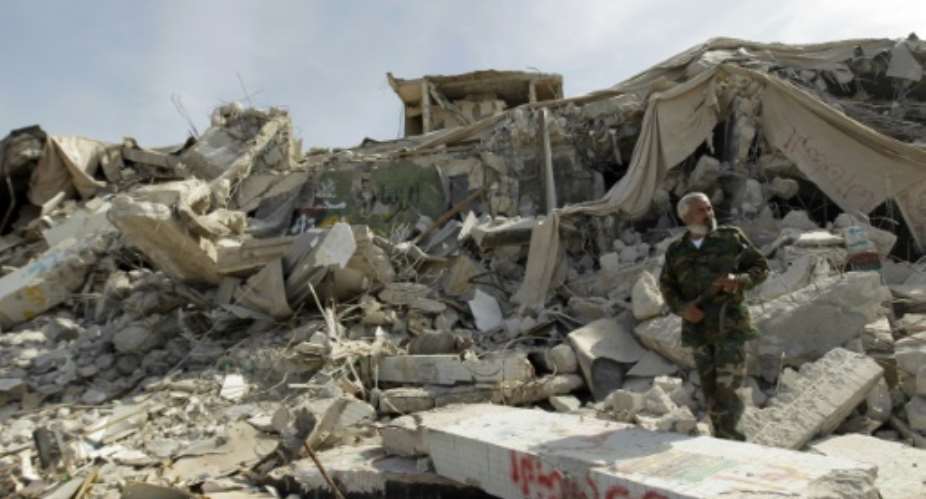Tripoli (AFP) - Torn apart by a year of fighting between two rival governments, Libya is now in tatters with hopes sparked by the ouster of dictator Moamer Kadhafi having fizzled out.
"The situation is more perilous than at any time since the fall of the Kadhafi regime in 2011," said Patrick Skinner, analyst with the Soufan Group intelligence consultancy based in New York.
For the past 12 months, the two governments have been waging an unrelenting battle for power in the oil-rich North African country.
One government, recognised by the international community, controls most eastern regions after fleeing Tripoli in July 2014, driven out by a motley coalition of Islamists and militants from Misrata.
In September last year, the Fajr Libya (Libya Dawn) coalition established its own government which is based in the capital and controls most towns in the west of the country.
Each side also has its own parliament.
Libya Body Count, an independent website which collates data from different sources, says the year of fighting, air strikes and attacks has claimed more than 3,700 lives, mostly in second city Benghazi, the cradle of the 2011 uprising.
- Magnet for Islamists -
"The worst tragedy outside of the loss of life in Libya is the almost complete deterioration of state institutions, the loss of which leads to several challenges, one of which is extremism," said Michael Nayebi-Oskoui, senior Middle East analyst at US-based global intelligence firm Stratfor.
Libya has been a magnet for Islamist extremists from across North Africa who have taken advantage of the chaos, including those of the jihadist Islamic State group which controls the northern city of Sirte.
The rise of extremism has seen dozens of journalists and human rights activists flee in fear of being detained or killed.
"One year after Tripoli was overrun by... Libya Dawn, the country remains divided, not just between the two competing governments but between tribes, expanding terrorist groups, and the competing influences of other regional countries," Skinner said.
With neither side able to gain the upper hand, the rival administrations have been taking part in talks under UN mediation aimed at putting in place a government of national unity.
But experts are sceptical about its chances of success.
"As long as the militia and tribes have as much or more firepower than (any future) central government," the two administrations will remain in place, said Nayebi-Oskoui.
- Collapse and disillusion -
The conflict has brought the Libyan economy to the verge of "total collapse", according to an official at the central bank, which has somehow remained intact despite the turmoil.
Oil production is currently estimated at 500,000 barrels per day compared with 1.6 million bpd before the summer of 2014, the official told AFP.
On top of that, investment projects have ground to a halt and public utilities have been left anaemic, with major cities crippled by power cuts that can last up to 14 hours per day.
Adding to these difficulties is the obligation Libya has to pay off external debt, including for infrastructure projects agreed with foreign and domestic companies, said the central bank official.
Such commitments amount to more than 100 billion dinars (about $73 billion, 63 billion euros), and have to be paid even though the projects are at a standstill because of the fighting.
The anti-graft watchdog Transparency International ranked Libya as the world's 10th most corrupt country for 2014.
One Libyan bank worker described it as being back in the throes of the era of Kadhafi who managed to stay in power through "injustice, repression and disorder".
A street sign in central Tripoli sums up Libyans' discontent with politicians in the post-Kadhafi era.
On a picture of a young man killed during the 2011 revolt, his family wrote: "We delivered a free Libya. What have you done to it?"





 Meta releases new version of conversational AI across its platforms
Meta releases new version of conversational AI across its platforms
 Cape Town named Africa’s Best Airport 2024 by Skytrax
Cape Town named Africa’s Best Airport 2024 by Skytrax
 Bono East: Four injured after hearse transporting corpse crashes into a truck
Bono East: Four injured after hearse transporting corpse crashes into a truck
 ‘Be courageous, find your voice to defend our democracy’ — Sam Jonah urges journ...
‘Be courageous, find your voice to defend our democracy’ — Sam Jonah urges journ...
 Exodus of doctors, nurses and teachers have worsened because of unserious Akufo-...
Exodus of doctors, nurses and teachers have worsened because of unserious Akufo-...
 2024 election: Avoid insults, cutting down people in search of power – National ...
2024 election: Avoid insults, cutting down people in search of power – National ...
 ‘You passed through the back door but congratulations’ — Atubiga on Prof Jane Na...
‘You passed through the back door but congratulations’ — Atubiga on Prof Jane Na...
 Government’s $21.1 billion added to the stock of public debt has been spent judi...
Government’s $21.1 billion added to the stock of public debt has been spent judi...
 Akufo-Addo will soon relocate Mahama’s Ridge Hospital to Kumasi for recommission...
Akufo-Addo will soon relocate Mahama’s Ridge Hospital to Kumasi for recommission...
 We must not compromise on our defence of national interest; this is the time to ...
We must not compromise on our defence of national interest; this is the time to ...
